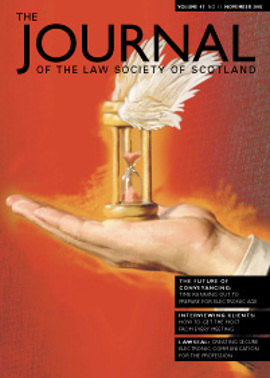In practice
Offering for property prior to survey
The Professional Practice Committee considered a case where a solicitor submitted what was on the face of it a clean offer not subject to survey and, after a qualified acceptance had been issued, withdrew the offer intimating that matters had been disclosed in the survey report which had caused the purchaser to reconsider. The Committee are of the view that it would be misleading another solicitor to submit a clean offer in the expectation that a de plano acceptance will not be issued and only instruct a survey when a qualified acceptance is received. It should therefore be made clear either in the offer or in a covering letter that a survey has still to be instructed even if the offer is not to be conditional upon a satisfactory survey.
Spouses instructing non mirror wills
The Committee considered representations in relation to wills prepared by the same solicitor for husband and wife. The husband’s will wholly favoured the wife but the wife’s will favoured the children of her previous marriage at the expense of her husband. It was suggested that there was a conflict of interest and that it was inappropriate for a solicitor to accept such instructions from spouses. The Committee did not agree, and observed that as a will is a private document particular to the testator, a solicitor is free to accept instructions from spouses to prepare wills in which the provisions differ significantly. There is clearly an issue of confidentiality. Without the authority of the respective clients, the solicitor may not disclose the contents of one spouse’s will to the other.
Conflict between a seller and a purchaser’s lender
This was discussed in the June 2002 “In-practice” column. That reported a previous decision of the Professional Practice Committee that although the Conflict of Interest Rules are silent on the specific relationship between seller and purchaser’s lender there was a significant potential for conflict of interest particularly in commercial transactions and it would be inappropriate for the same firm to act for a seller and the lender to the purchaser. The issue has now been the subject of further consideration by the Committee who were persuaded that the previous view was overly strict and that solicitors are entitled to exercise professional judgement having regard to the particular circumstances of each transaction provided that they do not breach Rule 3 of the Conflict Rules – i.e. act for seller and lender where there is an actual conflict of interest between them. Clients should be advised that a conflict may emerge in the course of the matter which would require the agents to withdraw. In the writer’s own view solicitors should be extremely cautious before agreeing to accept instructions from a seller of heritable property and from the lender to the purchaser.
E-mail and/or papers received in error
The Committee considered requests for guidance from a number of solicitors on the related questions of e-mail and documents received which were in fact intended for another party. The Committee had before it a report of an English case – Al-fayed v Metropolitan Police Commissioner – in which it was held “that if privileged documents were mistakenly disclosed for inspection by one party to litigation in circumstances where it would not have been obvious to a reasonable solicitor that a mistake had been made, the disclosing party was not entitled to an injunction ordering the receiving party to return the documents; and the receiving party should be allowed to make proper use of the documents on the basis that they were no longer privileged and no public interest immunity attached to them”. The Committee agreed with the approach of the English Court.
In relation to e-mails, if it is not obvious from the header that the e-mail is not intended for the particular recipient it will only become apparent once the e-mail has been opened and the contents read. The Committee agreed that in those specific circumstances there is no duty to delete the e-mail, return it or to cease acting and the solicitor is entitled to advise his own client of the contents. If the e-mail has not yet been opened before a request is received from the sender to delete it, that request should be complied with. Members are reminded of the need to ensure that e-mails are correctly addressed to avoid such difficulties arising.
In another case papers had been sent out by Faculty Services to the former employers of the instructing solicitor. The note by Counsel was backed up with the client’s name and the name of the individually nominated solicitor and it would have been obvious to the former employers that it was not intended for them. The Committee agreed that in these circumstances the papers should have been forwarded to the correct solicitor without being read or copied.
In this issue
- Opinion
- The future of conveyancing
- Don’t underestimate the value of people skills
- Lawseal promises secure electronic communication
- Pragmatic approach in going to proof
- Creating the most positive relationships
- Website reviews
- Nothing but the net
- Technology to the rescue?
- In practice
- Plain speaking
- Book reviews






